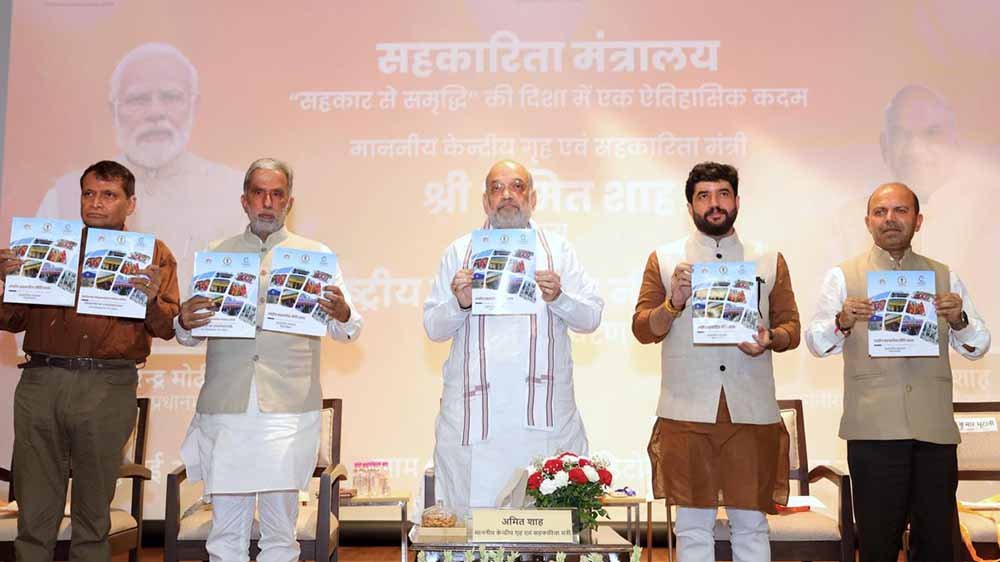TARGETS THREE-FOLD RISE IN SECTOR’S GDP SHARE BY 2034
Union Home and Cooperation Minister Amit Shah on Thursday unveiled the National Cooperative Policy 2025, calling it a transformative initiative to revitalise India’s cooperative sector and promote inclusive grassroots development.
The unveiling ceremony was held at Atal Akshay Urja Bhawan, New Delhi, in the presence of former Union Minister and chairman of the policy’s drafting committee Suresh Prabhu, Ministers of State Krishna Pal Gurjar and Murlidhar Mohol, Cooperation Secretary Dr. Ashish Kumar Bhutani, and other dignitaries.
Shah said the new policy, coming more than two decades after the first one introduced in 2002, was a product of extensive consultations with over 750 stakeholders including RBI, NABARD, cooperative leaders, ministries, and experts. The 40-member committee led by Prabhu held 17 meetings before finalising the document.
He highlighted that the policy aligns with Prime Minister Narendra Modi’s vision of ‘Sahkar Se Samriddhi’ (Prosperity through Cooperation), aiming to empower villages, agriculture, women, Dalits, and tribal communities. The policy also seeks to establish at least one cooperative in every village and build a self-reliant, inclusive, and tech-driven cooperative model by 2047.
Shah outlined six core pillars of the policy: Strengthening foundations, promoting vibrancy, future-readiness, enhancing inclusivity and reach, expansion into new sectors and youth engagement
He said the policy will focus on emerging sectors such as tourism, green energy, taxi services, and insurance, with successful cooperatives encouraged to collaborate and form new ventures. A notable initiative, ‘Sahkar Taxi’, will be launched by year-end, allowing drivers to retain full profits.
To modernise the sector, the policy mandates full digitisation, cluster-based monitoring, and creation of five Model Cooperative Villages per tehsil, under NABARD’s guidance. A new Tribhuvan Sahkari University has also been set up to train cooperative sector manpower.
Shah said 83 intervention points were identified, of which 58 have been addressed, 3 fully implemented, and 2 are under review. A key target is to triple the cooperative sector’s contribution to GDP by 2034, and involve 50 crore new or inactive citizens in the movement.
Currently, India has 8.3 lakh cooperative societies, and the policy aims for a 30% increase, besides setting up 45,000 new Primary Agricultural Credit Societies (PACS). Many of these PACS are being assigned new roles—managing PM Jan Aushadhi Kendras, LPG distribution, petrol/diesel outlets, and flagship schemes like Har Ghar Jal and PM Surya Ghar Yojana.
Shah informed that all states have adopted the model bylaws for cooperatives, keeping political affiliations aside. He also announced formation of three multi-state cooperatives for export promotion, seed production, and branding of organic products.
To ensure transparency and financial discipline, the policy proposes periodic legal amendments every 10 years, and aims to treat well-performing scheduled cooperative banks on par with commercial banks.
Responding to concerns about sustainability, Shah emphasised the environmental responsibility of cooperatives and stressed the principle of ‘Cooperation Amongst Cooperatives’ for long-term growth.
He concluded by stating that National Cooperative Policy 2025 is visionary, practical, and result-oriented, and will guide the sector over the next 25 years towards a resilient, inclusive, and self-reliant India.
Earlier, drafting committee chairman Suresh Prabhu and joint secretary Anand Kumar Jha delivered addresses. A film on the new policy was also screened by the Ministry of Cooperation.

